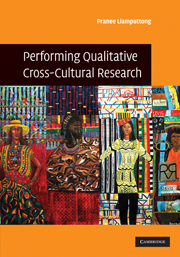Book contents
- Frontmatter
- Contents
- Preface
- About the author
- About the book
- 1 Performing qualitative cross-cultural research: an introduction
- 2 Moral and ethical perspectives
- 3 The research participants: accessing and reciprocity
- 4 Cultural sensitivity: a responsible researcher
- 5 Insider/Outsider perspectives and placing issues
- 6 Cross-cultural communication and language issues
- 7 Personal and collective testimony
- 8 Local knowledge, local power and collective action
- 9 Writing and disseminating in cross-cultural research
- In closing …
- References
- Index
- References
6 - Cross-cultural communication and language issues
Published online by Cambridge University Press: 05 June 2012
- Frontmatter
- Contents
- Preface
- About the author
- About the book
- 1 Performing qualitative cross-cultural research: an introduction
- 2 Moral and ethical perspectives
- 3 The research participants: accessing and reciprocity
- 4 Cultural sensitivity: a responsible researcher
- 5 Insider/Outsider perspectives and placing issues
- 6 Cross-cultural communication and language issues
- 7 Personal and collective testimony
- 8 Local knowledge, local power and collective action
- 9 Writing and disseminating in cross-cultural research
- In closing …
- References
- Index
- References
Summary
I lack language you say
No. I lack language.
The language to clarify
my resistance to the literate …
(Cherrie Moraga, cited by Anzaldua 1983: 166)Different languages construct different ways of seeing social life, which poses methodological and epistemological challenges for the researcher.
(Larkin et al. 2007: 468)Language and communication are central to qualitative research. Language is a fundamental tool through which qualitative researchers seek to understand human behaviour, social processes and the cultural meanings that inscribe human behaviour.
(Hennink 2008: 21)In this chapter, I shall point to the importance of language and communication in cross-cultural research. Often, researchers and the participants are from different linguistic backgrounds. But language, as Monique Hennink (2008: 22) contends, ‘represents data in qualitative research and communication’. It is ‘the process through which data are generated between a researcher and study participant’. Often, in carrying out cross-cultural research, the researchers are linguistically and culturally distant from their research participants (Hennink 2008). Differences in the language spoken and the meanings that are conveyed can create problems, and this has implications for the research findings. It is also an ethical issue, as misunderstanding may occur and this may result in the misinterpretation of the research findings (Irvine et al. 2008).
In this chapter, I shall first discuss issues pertaining to language. I then look at bicultural researchers and the need to provide training and support for them in cross-cultural research.
Information
- Type
- Chapter
- Information
- Performing Qualitative Cross-Cultural Research , pp. 135 - 161Publisher: Cambridge University PressPrint publication year: 2010
